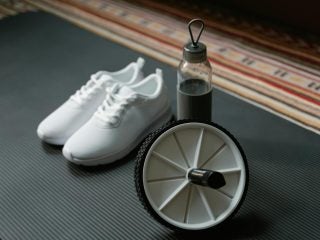When you feel too hot or are in the throes of a strong emotional state, you sweat, releasing a salt-based fluid from your sweat glands. This natural function allows your body to regulate your temperature.
Although sweating, or perspiration, is a natural body function that plays an essential role in keeping us healthy, it isn’t always a good thing. The moisture on your skin seeps into clothing, creating pit stains when the salt from your sweat dries. Sweating not only makes you look unattractive, but it’s also odorous and a medium for the growth of bacteria.
While society often strives to discourage us from perspiring too freely, there are times when it’s actually good to sweat. As a result of this paradox, it can be difficult to decide when you should actively work to suppress it with antiperspirants and trying to and when you should allow yourself to sweat freely?
Let’s take a look at when it’s good to sweat and when you should take steps to keep it under control
When Sweating Is A Good Thing
Sweating is highly desirable during exercise. It provides three major benefits: pain-relief, positive moods, and detoxification.
-
Pain relief
If you go to a Hot Yoga class, you’ll notice something interesting about getting hot and sweaty. That kink in your neck that you couldn’t get rid of will mysteriously disappear during your session. This relief of soreness occurs because exercise stimulates the neurochemical pathways in your brain that produces painkilling endorphins.
-
Mood switch
Endorphins also create a significant change in your moods. So, the next time, you’re in a bad mood—angry, stressed, depressed, or worried—do something that will make you hot enough to start sweating—like going for a run.
-
Detoxification
Sweating opens up the pores in your skin. The sweat not only helps improve your complexion as it releases the grime accumulating inside your pores, but it can also help your body get rid of any other system clogging substances like alcohol or excess salt.
When Sweating is Not a Good Thing
While sweating might produce beneficial health results when you exercise, it tends to be problematic in many social situations.
Here are four examples of when you should take steps to prevent sweating by having a cool shower, dressing without too many layers, and using antiperspirants:
-
When giving a speech
Sometimes you might sweat during a speech because the room is hot, or the spotlights are making the stage hotter, but you will often sweat because you’re nervous. Since you’re standing in front of the room because you’re a subject matter on something, it’s important that you exude confidence to win people over to your point of view. If you start sweating, people might get the impression that you’re nervous because you don’t know what you’re talking about.
-
When going for a job interview
Usually, the heat in the room is rarely the cause of sweating during an interview. Chances are that you’ve got too many layers of clothing because you’re trying to look sharp. You’re also likely to be nervous. Unfortunately, perspiring during an interview gives the impression that you’re not confident that you can do the work.
-
When going on a date
Naturally, you want to look cool, calm, and collected on a date. You don’t want to look nervous or emit a strong odor. It just doesn’t work, regardless of how charming you’re trying to be.
-
When participating in a meeting
The social impression you make during a meeting can have an influence on your career, particularly if the meeting is for some type of business or community event.
In conclusion, there are times when you need to sweat because it is healthy for you, yet there are other times when you need to do all you can to avoid sweating as it can result in awkward social situations, especially those that could impact your future success.

















